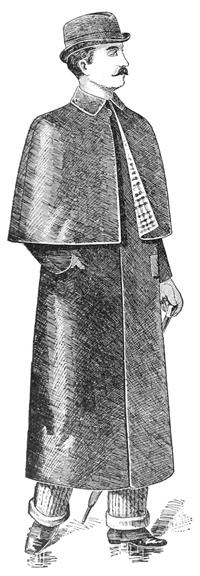PDF chapter test TRY NOW
“Here we are, my dear,” said the bearer of the white mackintosh, coming in through the window. “Who was that who bolted out as we came up?”
“A most extraordinary man, a Mr Nuttel,” said Mrs Sappleton. “He could only talk about his illnesses, and dashed off without a word of goodbye or apology when you arrived. One would think he had seen a ghost.”
Explanation:
The final four paragraphs of the story "The Open Window" occur in the absence of Mr Nuttel. As we had seen in the previous paragraph, Mr Nuttel had run away from the place. As he was leaving, the "ghosts" of the three men were stepping into the house.
Mr Sappleton, the bearer of the white mackintosh, walked in through the window greeting his wife. He said, "here we are, my dear", meaning that the three of them are back home. The greeting was warm and natural, and it was void of any kind of strangeness that is usually associated with ghosts. Mr Sappleton then enquired about the man who had "bolted out" as they entered. As explained earlier, Mr Nuttel left the house as the men entered, and hence, they had witnessed the former's strange behaviour.
Mr Sappleton, the bearer of the white mackintosh, walked in through the window greeting his wife. He said, "here we are, my dear", meaning that the three of them are back home. The greeting was warm and natural, and it was void of any kind of strangeness that is usually associated with ghosts. Mr Sappleton then enquired about the man who had "bolted out" as they entered. As explained earlier, Mr Nuttel left the house as the men entered, and hence, they had witnessed the former's strange behaviour.

A gentleman's Macintosh, from an 1893 catalogue*
To answer Mr Sappleton’s question, his wife explained that the visitor was Mr Nuttel, describing him as "a most extraordinary man". Here, the word "extraordinary" doesn't carry a positive meaning. Instead, the phrase "a most extraordinary man" suggests that Mrs Sappleton sees Mr Nuttel as a strange man. His actions were perplexing, and as she further explains, he could only talk about his illnesses.
Mrs Sappleton was further confused as to why Mr Nuttel had fled. Moreover, he left without a goodbye to the hostess or an apology to the men who had just arrived. As Mr Nuttel failed to do both, Mrs Sappleton simply assumed he lacked manners and was rather impolite and uncultured.
Finally, Mrs Sappleton adds that Mr Nuttel's actions would make one think that he'd seen a ghost. The statement is ironic because Mr Nuttel had indeed scooted away because he thought he had seen ghosts. The line is also essential because it changes the way the story and characters were perceived until now. We realise that the men weren't ghosts, as Vera had claimed, or Mr Nuttel was made to believe. Furthermore, Mrs Sappleton wasn't perfectly sane, unlike what the readers had interpreted. Due to Vera's story, the characters had misjudged each other, and so did the readers.
Moreover, it is intriguing to note that the line "he could only talk about his illnesses" has got two sides of stories. Mrs Sappleton thought Mr Nuttel to be strange because he spoke only about his illness. In contrast, Mr Nuttel thought that Mrs Sappleton was mentally unstable and spoke about his illness. As we had already seen, Mr Nuttel had his reasons for talking about his illness.
The above two paragraphs are important because they reveal the fact that there aren’t any ghosts. However, what is peculiar about the paragraphs is that the revelation is only for the readers. Framton Nuttel, the only character who thought that the men were ghosts, left the scene before he could learn the truth. On the other hand, the rest of the characters (excluding Vera) never realized that the men were projected as ghosts. Again, there is no revelation there. However, the only character who knows what had unfolded in the house is Vera. So, would she clarify the matters and reveal the truth in the end?
Meanings of difficult words:
S.No | Words | Meanings |
1 | Bearer | A person who is carrying something |
2 | Mackintosh | A raincoat that is made out of rubberised fabric |
3 | Bolt | To move very fast, especially as a result of being frightened |
4 | Dash | To go somewhere quickly, especially by running |
Reference:
National Council of Educational Research and Training (2008). The Open Window – Saki (pp. 55 - 61). Published at the Publication Division by the Secretary, National Council of Educational Research and Training, Sri Aurobindo Marg, New Delhi.
*A gentleman's Macintosh, from an 1893 catalogue: https://commons.wikimedia.org/wiki/File:Carson,_Pirie,_Scott_%26_Co._Macintosh,_1893.jpg
